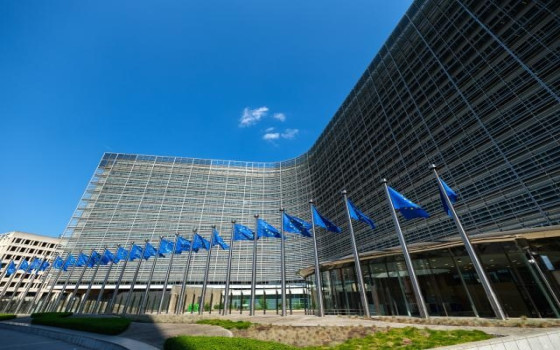
EU officials called on leaders to impose sanctions on Israel and take immediate action to pressure for aid to enter Gaza. Commission members frustrated by European silence. Germany reconsider.

- Europe and Arabs
- Thursday , 31 July 2025 11:9 AM GMT
Brussels: Europe and the Arabs
European leaders are still arguing over suspending Israel's participation in the Horizon research exchange program, leaving those at the heart of the Gaza tragedy speechless. According to the European Politico magazine in Brussels, it added: International outrage is mounting over the killing and starvation of Palestinians in the Gaza Strip. In Europe, frustration is mounting even among members of the usually cautious European Union's College of Commissioners, with Executive Vice President Teresa Rivera issuing a rare rebuke to her colleagues and her boss, Commission President Ursula von der Leyen, in an interview with Spanish radio station Cadena Ser.
"For months, almost every week," Rivera said she has been urging von der Leyen to take a stronger stance against Israel, according to Aitor Hernandez Morales of Politico. Rivera said the divisions in the European Commission mirror those among European leaders, who failed on Tuesday to agree on a proposal to cut Israel from the EU's Horizon research exchange program, partly due to Berlin's reticence. Ribera compared the suffering of civilians in Gaza to that of Jews imprisoned by the Nazis in the Warsaw Ghetto during the Holocaust, and criticized the European Union for standing idly by while "one of the worst humanitarian scandals" in history unfolds. "We are in a race against time, and people are dying of hunger," she said.
Berlin remains a major obstacle here, where Chancellor Friedrich Merz is under increasing pressure from his coalition allies, according to Politico.
Last Monday, Merz stated that he would await the results of his Foreign Minister Johann Wadephul's two-day visit to Israel and the West Bank. After Wadephul's visit, which begins around noon today according to the Berlin Guide, the government will reassess its position on suspending Israel's participation in the Horizon program. Wadephul is scheduled to meet with his Israeli counterpart, Gideon Sa'ar; a meeting with Israeli Prime Minister Benjamin Netanyahu is rumored, but has not yet been confirmed.
In an interview with Berlin Guide, Wadephul spoke about what he hopes to achieve. "The main goal is definitely a ceasefire," he said. He called for more humanitarian aid, saying, "The number of victims in the Gaza Strip is very high. We need to bring relief to the people there." Berlin is also demanding that Hamas release the remaining Israeli hostages. Wadephul stated, "There are still 50 people missing. It is likely that about 20 of them are still alive. We want them released; this is our top priority."
West Bank:
Germany has a "clear opinion" regarding Israel's talk of annexing the West Bank, and Wadephul said he intends to make this clear to the Netanyahu government. He added, "We support the two-state solution, adhere to international law, and do not approve of illegal settlements in the West Bank. We have always emphasized this."
What will happen after Wadephul's return? As reported in Berlin Playbook, it all depends on Wadephul's assessment of the situation. A Security Council meeting is scheduled for next Monday, which could see Berlin change its position on sanctioning Israel, but that is not a given.
After his return to Germany, Merz faces scrutiny. The Social Democratic Party (SPD) in the ruling coalition, along with some in the opposition, has begun to question Germany's unwavering defense of Israel. A diplomatic source told Politico: "The pressure on Germany may come more from within than from other EU countries. Even the Christian Democratic Union can no longer justify or cover up Israel's actions." Italy, formally allied with Germany, is also reconsidering its position.
The Dutch Shift: The Netherlands, a traditionally vocal supporter of Israel, is also signaling—at least rhetorically—a shift. A spokesperson for Dutch Foreign Minister Caspar Veldkamp told Politico that due to the "lack of progress" in agreements between the EU and Israel on humanitarian aid to Gaza, the Netherlands has decided to call for the suspension of the trade chapter of the EU-Israel Association Agreement.
But for people on the ground, the EU's inability to agree on what amounts to a largely symbolic measure underscores its powerlessness. “The mere fact that the EU can’t agree on even the smallest possible step… is a joke,” Bushra Khalidi, Oxfam’s policy officer in the Palestinian territories, told Playbook, the European version of Politico. Small goals: “It’s crazy that this is where we’re talking, where we tell you, ‘800,000 children are on the brink of starvation, and what you’ve come up with is potential Horizon sanctions, 140 trucks, and airdrops.’” She added that Gaza needs to completely rebuild its hospitals, along with far more fuel, food, and medicine than even small humanitarian convoys can provide.
Khalidi said it would be more effective if the European Union, Israel’s largest trading partner, stopped trading with it and selling it defense equipment. “EU member states, not the EU as a whole, are some of the biggest arms manufacturers that manufacture weapons for Israel,” Khalidi added. “These companies are setting the conditions—it’s unthinkable that these options are not on the table yet.”
Playbook reported, “EU officials have written to Ursula von der Leyen and High Representative Kaya Kallas, urging them to “take immediate and decisive action to pressure Israel to allow massive humanitarian aid into Gaza.”The letter, which one organizer said was signed by around 850 employees, called for measures including targeted sanctions and for the European External Action Service to suspend diplomatic relations with Israel.












No Comments Found